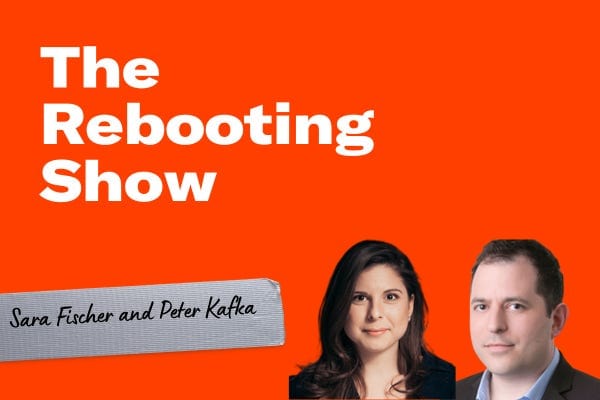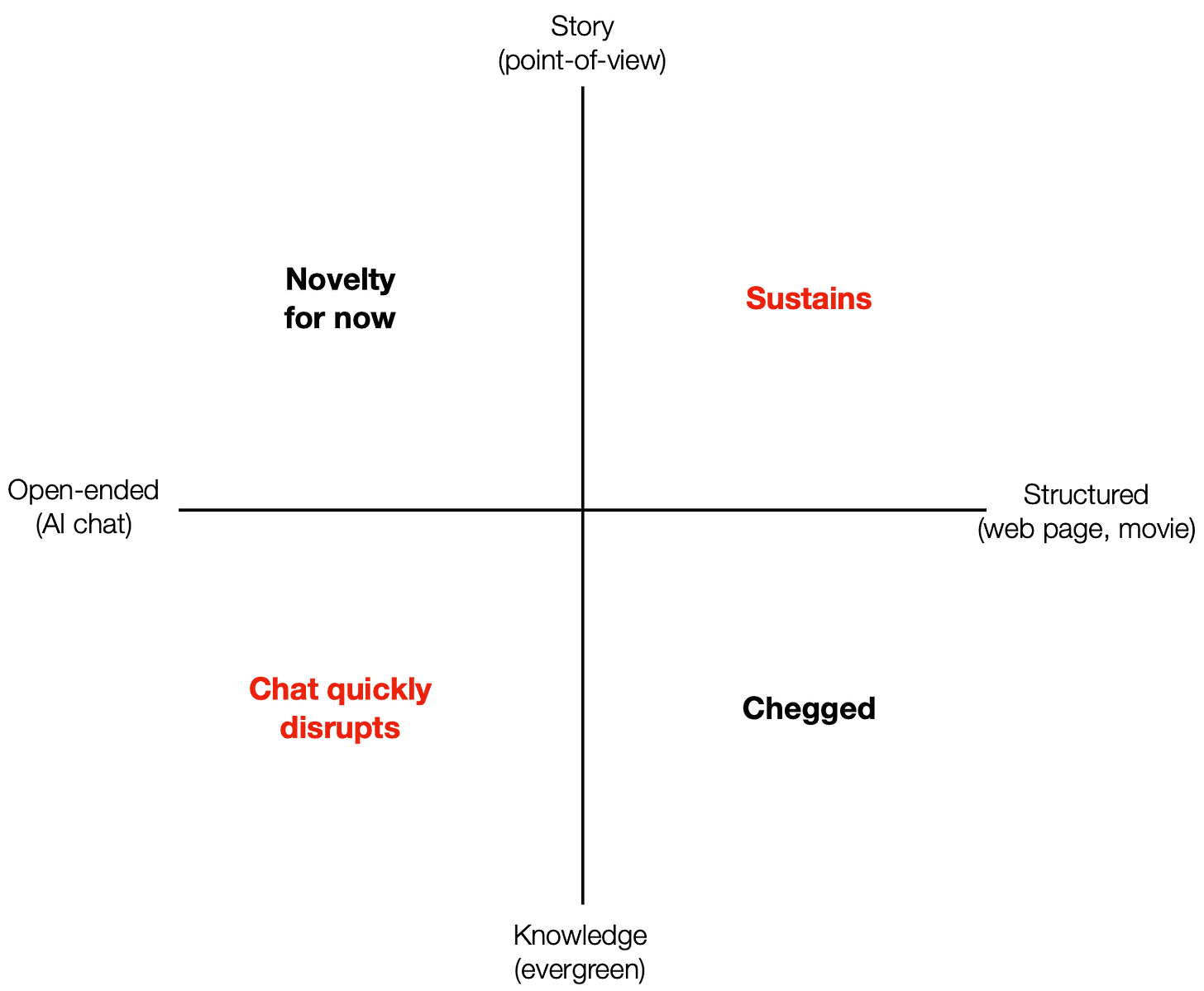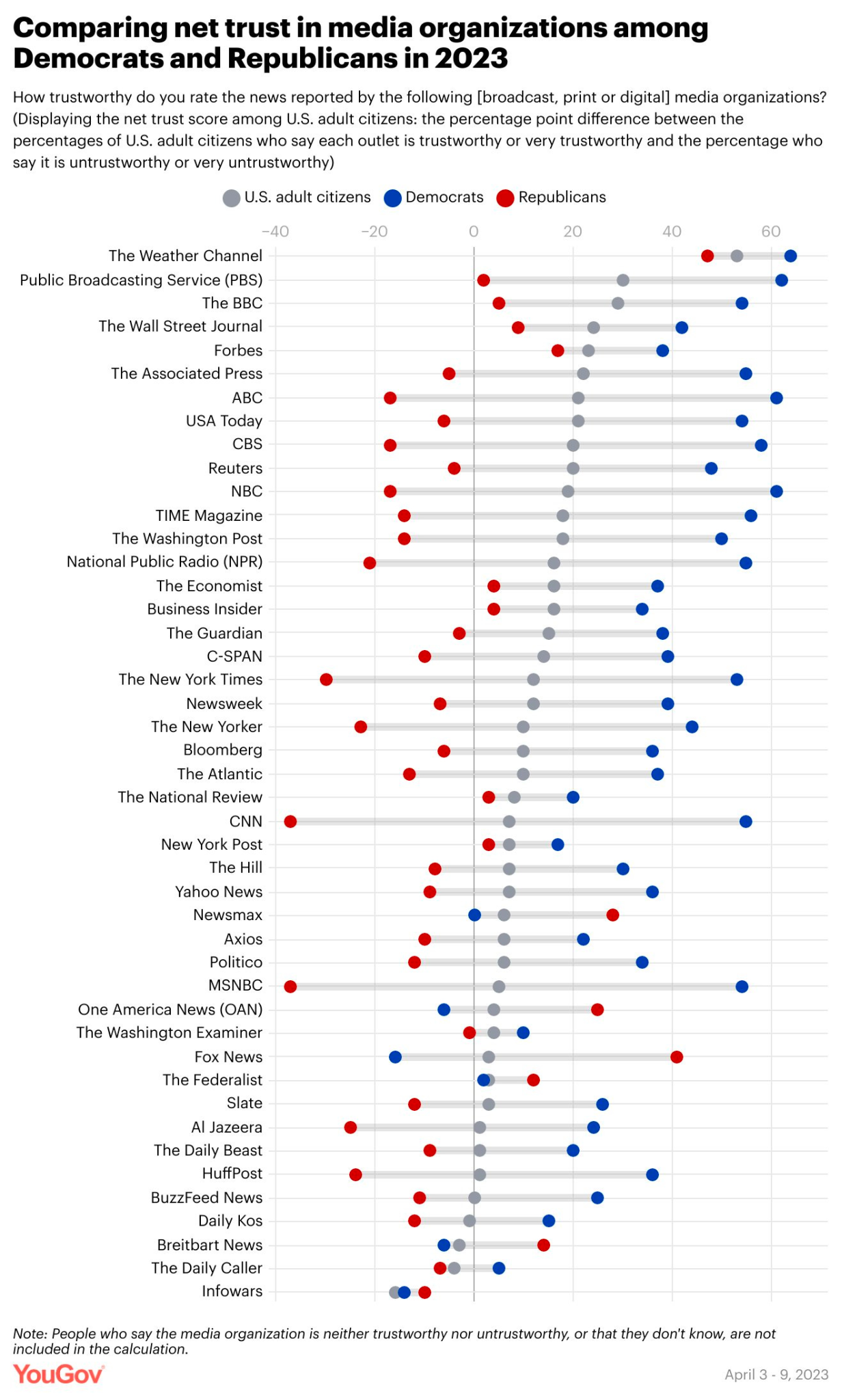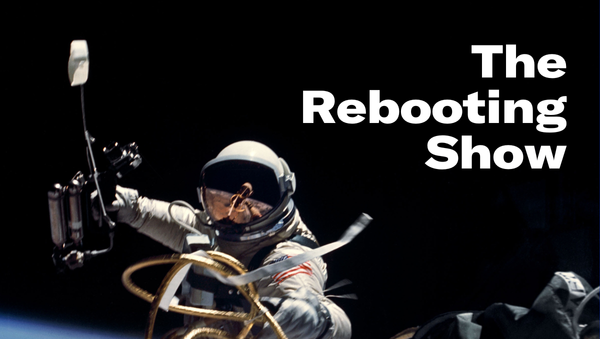Where the media business goes next
Axios's Sara Fischer and Vox's Peter Kafka on the flight to niche, The Messenger, AI and more

Reminder: If you got the hardship assignment of heading to the Cannes Lions next month, sign up for :“The New Attention Economy,” a three-day event The Rebooting is putting on with Kerv at the Cannes Lions from June 19-21. We’ll be holding a cocktail party at the Kerv Cafe following the programming on Monday, June 19, from 3-5pm. We’ll be announcing speakers starting next week.

Does your email engagement stack up?

Each quarter, we compile email engagement stats from Omeda clients into one report, so you can better evaluate your success and ultimately, better connect with your audience.
And this quarter, there’s no escaping the economic outlook — and its implications for marketers. So this quarter, we’re focusing on ROI this quarter. Here’s what we’ve got on deck:
- Overall email engagement
- Performance by deployment type, including a deep dive into promotional email engagement since Q3 2022
- A review of our recent re-engagement campaign — and takeaways for your own re-engagement efforts
- Actionable ways to recession-proof your email marketing
AI’s coming “tsunami of bullshit”

When I sent over topics for the latest episode of The Rebooting Show to Axios’s Sara Fischer and Vox’s Peter Kafka, Peter replied with an editorial note: “Maybe something deliberately upbeat to counteract a very gloomy pod.” Listeners, we tried, but journalists don’t naturally do upbeat.
Some highlights:
- This is a good time to be niche: “Niche media is thriving in an era where generalist media seems to be declining,” Sara said. “Companies that launch with a little bit of money, but in a targeted way, focusing on one specific thing with authority, tend to build incrementally and more sustainably than companies that try to do it all at once upfront.”
- The Messenger is coming next week and… counterintuitive: “I don't believe that there is an audience that's salivating out there for straight-down-the-middle news,” Peter said. “Anyone who says that is lying to themselves or to the public.”
- After the streaming wars comes the winnowing: “You’re going to have fewer of these big subscription services, more of these free ad-supported services, and streaming will continue to dominate more of the time that people spend in terms of consuming television,” Sara said. “No longer is it plausible that everyone can just launch a subscription service and think that they're going to take meaningful market share.”
- The AI “tsunami of bullshit” is coming: “We're still relying on Google for referral traffic and the idea that people might find our articles there,” Peter said. “Whether or not you use AI, you are going to be swamped by the tsunami of bullshit, whether it's good or not, content made by robots. And even if every publisher and every trade group in America agrees to not do it, it doesn't matter because it'll come from all over the world.”
Appreciate Sara and Peter for doing the podcast. Sara somehow managed to break the news of Puck’s CEO leaving the company while we were recording. Be sure to check out Peter’s recent series on AI on Recode Media.
Thanks to Impact.com for sponsoring The Rebooting Show. Check out “The State of Commerce Content” report done in conjunction with Digiday.

Separating the wheat from the chaff
I spoke with LiveIntent CEO Matt Keiser about the idea that restrictions on data collection, from both governments and platforms, will force publishers to “earn addressability.”
When a publisher invests in email, it builds a relationship with readers, earns addressability, and captures a data point that is cross-channel and cross-device that Apple and Google can’t restrict. A smart email program is opt-in and consent driven.
Email is the workhorse of CRM and provides a fair value exchange since the consumer is in charge and can, at any time, opt out or unsubscribe. Publishers will need to earn addressability by making their content so appealing and crucial to a reader’s life that people will want to raise their hand and ask for an email relationship. CAN-SPAM was a gift, in many ways. Permissions and email means this is a relationship readers understand and consent to. Although it’s become more difficult as Apple embraces attacking publishers by sitting between them and their customers, still, the privacy era is a great thing for publishers that are able to earn addressability: it will separate the wheat from the chaff.”
Learn more about how LiveIntent helps publishers adapt to thrive in a privacy era.
Noteworthy
Nobody wants to get Chegged. The education-tech company blamed ChatGPT for students skipping the need for Chegg’s services. AI is a handy villain for shitty results, but Troy Young used Chegg as a great hook – I’m worried, Troy, you’re starting to pick up the tricks of the trade – to look at the possibility we are entering a time when few moats exist. If even Google is worried about not having a moat – they’ll be fine, let’s be real – the media business is in for even more value destruction. Troy even mapped it out in a 2x2, which I learned during my few forays into consulting is where everyone goes in a presentation.

Something I’ve thought about lately is how value will accrue further with those who can connect dots. ChatGPT is fine with spitting out basic information. And it will improve. But I have yet to see it be able to make connections between ideas across disciplines. The best place to be is, yes, in a focused area, but to also be able to make connections across the human experience, and combined with a coherent point of view and relatable personality. That’s not something well done (yet) by computers. It’s also the peril of going too niche. “The problem with niche strategy, in a nutshell, is that it's a reliable destroyer of the human spirit,” writes Rob Hardy in Every. “It's built on the assumption that we can segment ourselves and turn one static aspect of the self into an economic engine that makes the rest of our life feel how we wish it'd feel.”
The near-term strategy for dealing with this wave of AI disruption for established media companies will come down to block, lobby and sue. The New York Times wringing $100 million from Google is a template for how the most powerful media companies will initially box their corners. The publishing business might be a so-so to terrible business, but it has political heft. Just as Kendall and Roman decided to “go regulatory,” media companies will exert pressure on those building LLMs to get a cut.
Expect AI to be the newest battle front in the push and pull between capital and workers. I see AI as another accelerant to existing trends as opposed to a black swan. The ongoing writers strike in Hollywood has roped in AI, as writers want assurances their work won’t be used to train language models. The unions have an uphill battle, as they’ll struggle to stop the adoption of technology, outside highly regulated spheres like medical. But more to the point, ChatGPT isn’t writing the next Succession. (Cheat code: The answer to any question headline is always “no.”) Human beings have told each other stories since the caves.
Meanwhile, those not maneuvering chess pieces will need to simply adapt. ChatGPT and its ilk are often painted as replacements for journalists, which is at this moment fairly absurd. The overuse of “cutting edge” in results from ChatGPT alone is disqualifying, and yes, it will improve. The near terms offers more opportunity than threats, in my view. AI tools like ChatGPT and Midjourney are more additive than replacements for most roles. Publishers need AI tools to get more efficient and do more with less, because despite the nostalgia for the homepage and better times, the future of publishing is leaner.
The internet overall hasn’t been great for establishing trust. The old New Yorker cartoon – “On the internet, nobody knows you’re a dog,” a dog says while moving a mouse – has continued to ring true, and digital news brands have never established trust levels of the dinosaurs they were supposed to replace.

Everyone who has any form of attention is in the ad business or soon will be. Macy’s is the latest retailer to spin up a media operation. What’s more, retailers sit on a trove of targeting data that are far more valuable signals than what content publishers are working with. Ads will remain a difficult business for most publishers, unless they focus on specific, high value pockets like B2B and political or movie awards lobbying.
Silicon Valley has set work patterns for years. It wasn’t until the endless stories of Google’s cafeteria that non-tech companies gave employees much. At Adweek, we had a vending machine in a dark stairwell, stale coffee and a weekly awkward pizza lunch. Soon every company had a snacks programs. Tech companies are increasingly turning against remote work, with OpenAI’s Sam Altman the latest to preach the virtues of in-person interaction. No mention of the terrible commutes.
Something fun: A decade ago, journalist Paul Salopek set out to find stories to to tell the old-fashioned way, by walking around and talking to people. Paul took this to extremes, setting out to retrace human migration patterns on a 24,000 mile journey on foot that will take him from Ethiopia, up through the Middle East to China, across to North America and eventually to Tierra del Fuego. “This is my job, I’m not doing this for an adventure or to explore new landscapes or see new destinations,” he told the BBC. “What’s more interesting to me are people. So I have a hard time answering the question: what’s your favorite place? I don’t have one. I have favorite people. What motivates my work is the inner map of what it is to be human. What makes us amazingly diverse but also very much alike at the same time.”
Out and about
If you’re in Chicago, I’ll be interviewing Time CEO Jessica Sibley on Thursday at Omeda’s OX6 event. I want to dig into Jess’s big move away from the prevailing winds of subscriptions to make Time digital content free. Every brand is different, and paywalls are not a one-size-fits-all strategy. Time has a ton of brand equity, and it can use that to extend its franchises.
Also, if you’re in Washington DC, I’ll be interviewing Industry Dive CEO Sean Griffey on Thursday, May 18, as part of a MACMA event. Come to Industry Dive HQ for the chat and lunch. Registration and more information is on the MACMA site.
Get in touch if you want to discuss sponsorship options to have a conversation with over 16,000 publishing professionals. My email is brian@therebooting.com.




